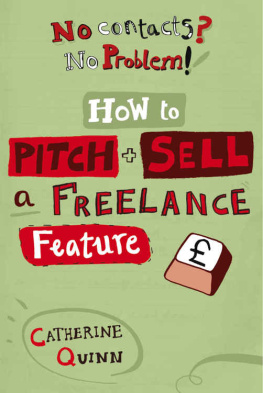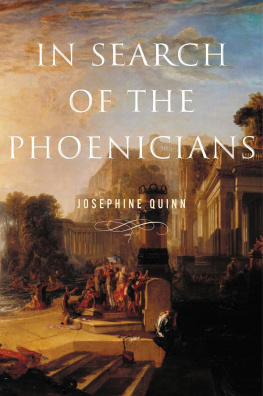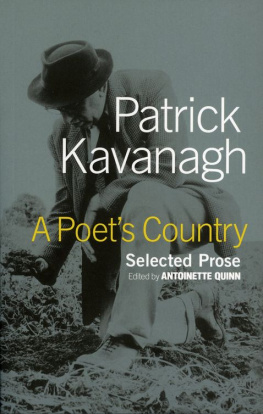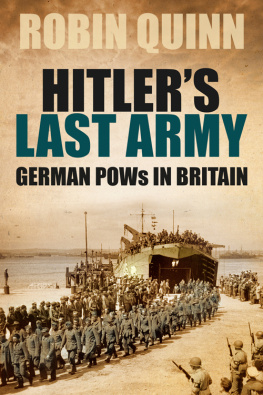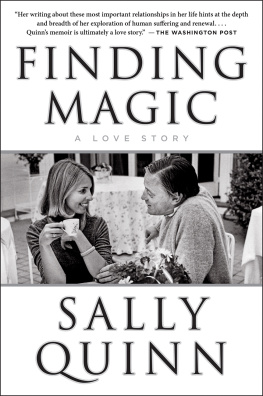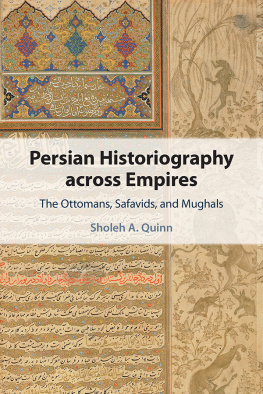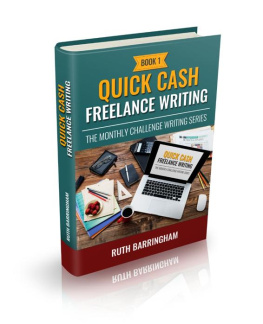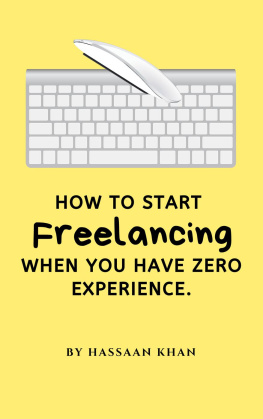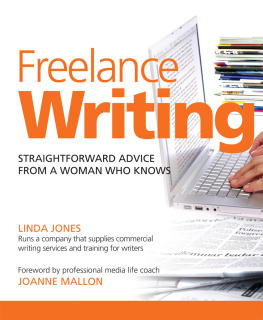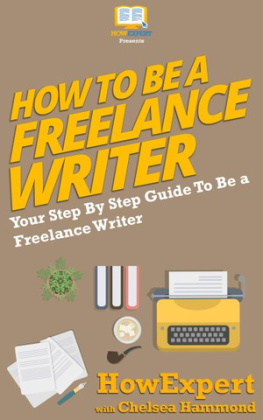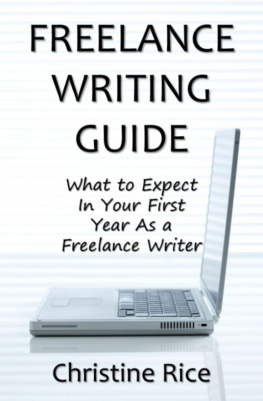Table of Contents
No contacts? No problem! How to pitch and sell a freelance feature
Pageturners
First published in Great Britain in 2016 by Pageturners Publishing
35 Cambridge Road
Hove
BN3 1DE
Copyright Catherine Quinn, 2016
Catherine Quinn has asserted her rights under the Copyright, Designs and Patents Act, 1988, to be identified as the author of this work A CIP catalogue record for this book is available from the British Library
IMPORTANT
To access the website reader-only resources, youll need the page number codes listed at the very end of this book.
If you want to get something published in a national newspaper or magazine but you have no idea how the process works, then this book is for you. Like many people looking to break into journalism, you may be wondering whether its possible to start out as a freelance feature writer, and if so, how you can get that vital first piece in print.
If youve found that the process is mysterious and that those in the know are somewhat unwilling to spill the beans on how it all works, youre certainly not alone. Freelancing is a notoriously guarded subject area, not least because many who make a living from the process have done so by building up contacts over a number of years.
The good news is there is a way in at ground level, even with no experience and no contacts. Given that you have the talent and motivation, anyone can get their work published in a national newspaper or magazine without connections, experience, or a family member on the editorial team.
The information in these pages will be invaluable to you if you are:
A student on a journalism course, or a student on any other course looking to get into print or journalism.
A career changer, or job seeker hoping to crack the business.
A current freelancer keen to expand your net and approach editors not formerly known to you.
You will also find this book very useful if you are:
Committed to attaining a staff role on a publication, and know that examples of your work in print will help you achieve this.
Thinking of going into PR, press relations or marketing, and looking to enhance your knowledge of how to get your clients in the press.
Have a big idea for which youre keen to get national exposure.
Want to use published newspaper or magazine features as a springboard into another area of writing.
The No Contacts method outlines a tried and tested way for writers with no published work to get that vital first commission in a national publication. It lifts the lid on the systems which even established staff writers take years to learn, and outlines a fast-track technique to getting your work commissioned by top publications.
Just the facts
If youve already read a few books aimed at freelance writers, youll notice that plenty of them tell you how to write well, and a few offer useful tips for established freelancers. But when it comes to a book which explains how to go from no clips at all to a published piece in a national newspaper, suddenly the publishing world draws a blank.
Because this book outlines the nuts and bolts of freelance feature writing for the absolute beginner, it focuses primarily on the process of pitching ideas, rather than writing features. You wont read about the grammatical nuances of a great feature in these pages (although you will learn what makes a great idea for a feature). Neither will you discover how to maximise your income levels, specialise, serialise or syndicate your work. That all comes later, because if youre starting out, your primary concern is how to get published in the first place.
What you will learn about in detail is what goes into a pitch that gets commissioned, how to focus and target the magazines which offer you the best chance of getting in print, and how to follow through and chase up your pitches to get them published.
No Contacts? No Problem! will show you how to:
Work with the processes used by editors to commission new writers.
Identify what makes a winning feature idea.
Understand the formats which make editors buy ideas.
Learn how rejection can be turned to your advantage.
Deal with having no clips to show editors.
Once youve got a commission using this book, the rest is up to you. If youre dedicated, then practising the techniques outlined in these pages should be all you need to springboard your first few features into a long-term writing career. And once youve got started, there are a number of resources available which can help you further hone your ability to get work, make money and write great features. Some of the most useful are listed in the recommended reading section on pages 17072.
You can write right?
The No Contacts method does assume a few things, though. This is a fast-track technique for writers who know theyve got what it takes. So firstly, its assumed that you can write well enough to be published in a national publication. If that sounds daunting, tough: youre either ready to start freelancing or youre not. If you dont have the confidence that you can produce this standard of writing, then take a writing course, buy a book on grammar, or do whatever you need to do to get your writing to the necessary standard before attempting to use the method outlined here.
If you feel that your writing is good enough to be paid for by a newspaper or magazine, then youre ready to get started. Its not assumed that you will have the experience of an established freelancer when it comes to how quickly you can turn out quality work, or that you know anything much about freelancing. Just that you have the potential to get faster at attaining that professional quality and will put in the effort to learn your trade.
How much do you want to be in print?
Do you really really want to be in print? If the answer to that question is anything other than a firm yes, then this book isnt for you. The strategy outlined is only effective when combined with dogged determination and a lot of hard work. If you want to take an easier, longer route, start looking for a staff job. The No Contacts route is like an intensive training course youll get there faster, but its much more effort in the short term.
If youre only half sure, or thinking of dabbling, then to put it bluntly forget it, at least as a career. Freelance feature writing is incredibly competitive and theres very little room for people who think they might want to do it. You could get lucky, and use the techniques in this book to hit on a commission immediately. But its more likely that youll have to endure at least some rejection when youre moving towards your first published article and a lot of knock-backs if youre putting the procedures in place to become freelance full-time.Youll get there in the end, but some one whos anything less than 100% dedicated will most likely find the rejection hurdle too difficult to overcome.
Heres the good news, though. If you know your writing is of a high enough standard to be published, and youre prepared to work hard to get something in print, then the processes outlined in this book are your ticket to that first commission.
If this seems like a bold claim, its not. Although reading this book and putting the system into practice is straightforward, it will also involve plenty of dedication and effort from you. There are no practice questions here everything youre shown how to do is the real thing, tailored for editors of current publications.
Once youve got your action plan underway, youll be committing fully to conducting your own intensive training course. At the end of it youll have learned first hand, through your own experiences, what makes it into print and what doesnt. Not to mention having built up a comprehensive knowledge of which magazines are easiest to get work from, which editors get back to you quickly, and which you should write off. This book may provide you with the course content, but its you wholl be putting in all the hours.

